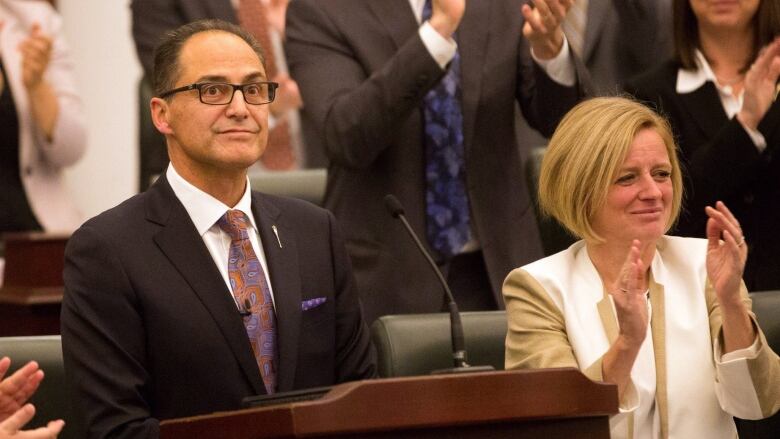Alberta budget 2015: Praise and criticism for NDP spending blueprint
Calgary mayor, teachers and students pleased while Wildrose and Liberal parties slam plan

The Alberta government's plan to post a $6.1-billion deficit as it embarks on an ambitious spending plan to stimulate Alberta's economy is getting mixed reviews from itspolitical critics and stakeholders.
- OTHER BUDGET NEWS|Alberta finance minister explains his budget choices and takes your calls
- OTHER BUDGET NEWS|Calgary cancer centre to be built at northeast corner of Foothills hospital site
The NDP plans to spend $34 billion on capital projects over the next five years to spur the economy, a 15 per cent increase or additional $4.5 billion from what the Tories promised in their last budget in March.
Premier Rachel Notley's government also plans to exhaust Alberta's contingency fund and boost revenueswith help from new taxes higher corporate taxes and sin taxes and an end to the flat 10 per cent income tax to cover its costs.
The goal is to return to balanced budgets by spring2020.
Nenshiwanted affordable housing plan
Calgary Mayor Naheed Nenshi sayshe's happy the budget includes major new funding for infrastructure projects.

"While the Green Line LRT project is not specifically mentioned in this budget, there is nothing in this budget that precludes it, and we will continue discussions with the province about how they will participate in the project," he said in a written statement.
"We remain disappointed that there is little in this budget with respect to affordable housing which is a provincial responsibility but we hope this will be addressed in the March 2016 budget," he added.
The province did earmark$387 million for rural and urban sustainable housing renewal, but theAlberta Urban Municipalities Association (AUMA) issued a statement on Wednesday saying the province isreneging on its obligation to pay a grant in lieu of tax on government owned and supported social housing.
"This represents a downloading of about $15 million in costs onto the shoulders of municipalities who are already struggling to address infrastructure deficits as a result of shortfalls in federal and provincial funding," said AUMApresidentLisa Holmes in the release.
"Edmonton and Calgary will be impacted by $5-6 million each, with other municipalities across the province collectively bearing another $4 million in costs.A decision like this means municipalities will have to reduce critical municipal services or increase the taxes for other property owners in order to make up the shortfall."
AUMAgives mixed review
But theAUMAalso hadpraise for the government's plan to boost spending in other areas.
"[Tuesday's]announcement of increased funding for municipal water and wastewater systems and transportation and public transit hold great promise for our province," saidAUMApresident Lisa Holmes in a release.
"Investing in municipal infrastructure is essential to increasing our productivity, improving environmental stewardship and ensuring a better quality of life for all Albertans."
Wildrose questions numbers
The Official Opposition says the NDP budget is plagued with risky economic theories and fantasy five-year projections.
Wildrose Party leader Brian Jean warns tax increases will hit every Albertan and every individual will have less money in their pocket.
He says the plan will plunge Alberta into the deepest level of debt in its history, and he questions the numbers the government used to come up with its plan.
"Albertans need to clearly see some of the projections they have in relation to growth, 25 per cent, we've never seen it before and certainly not under these economic conditions," he said.
"Will we see it? So we are very troubled indeed by some of the numbers they're using and some of the forecasting methods they're suggesting."
Liberals want repayment plan
Liberal party leader David Swann says he was looking for a proactive budget that would meet the needs of Albertans.
While he sees a few positive lines in the document, he says ultimately the budget falls short.
"Well, I'm pleased to see the investment in infrastructure. We're going to protect jobs and develop the infrastructure that we need. I don't see a repayment plan, I'm sorry to see pilfering of the Heritage Savings Trust Fund, I'd very much like to see a stronger stimulus package than just subsidizing small business."
Swann says Alberta now has a massive and growing operational deficit with noaction to address the root cause of that deficit.
Teachers union pleased
Alberta's teachers are pleased the budget made good on the NDP's commitment to increase education funding.
It reverses previous cuts to education spending presented by the Tory regime last March.
The spending blueprint includes new money to fund projected enrolment growth of 1.5 per cent across the province next year including $44-million going into the next year.
The stability in funding should be reflected in the classrooms, says Alberta Teachers' Association president Mark Ramsankar.
"At this point we'd project approximately 400 teachers and an extra 150 support staff, educational assistants. This will have a direct impact on the classroom and that is welcome news," he said.
Ramsankar calls the budget a great first step in starting to address at least six years of education deficits.
Tuition still frozen
The budget also confirms a June announcement by the NDP government for a two-year post-secondary tuition freeze.
Shannon Brown, a fourth-year commerce student at the University of Calgary, says she's happy the government made good on its promise.
"I think that it kind of eases peoples' minds but also will draw more people into actually going to post-secondary versus people who maybe wouldn't have entered because the tuitionskeep increasing year to year," she said.
"They may have more of an option to actually be able to enter post-secondary now."
In addition to the two-year tuition freeze, the government reversed a 1.4-per cent cut to post-secondary institutions and increased base funding by two per cent.












_(720p).jpg)


 OFFICIAL HD MUSIC VIDEO.jpg)
.jpg)



























































































